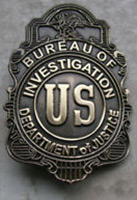“In the weeks following the murder, unsteady piles of paper began to multiply on J. Edgar Hoover’s desk. There were eyewitness accounts, cables and field reports from virtually every state in the union, and some from as far away as Europe, Central America, and even Asia. Most of the documents referred to events already well known to the Bureau of Investigation (soon to be known as the FBI) and these would be filed for future reference. Several pieces of information, however, provided new and increasingly bizarre versions of what the Wanderwell Expedition was really up to on their tour around the world.
 Some informants told tales of drug smuggling, theft, fraud and even attempted murder. Others suggested espionage and various brands of political subversion. Then there were the tales of white slavery, kidnapping, and pornography. In a deposition taken by Special Agent Melvin Purvis (who later became famous for ‘getting his man’ – John Dillinger), one informant claimed that Walter Wanderwell had been smuggling drugs into England. The informant, who was also a business associate of the Wanderwells, said he had been viciously beaten by Walter and hospitalized. He said his passport had been stolen for the purpose of committing fraud. By contrast, others described Wanderwell as a peace evangelist, promoting an international police force to help control global arms proliferation. Some said he was a great filmmaker, or an educator, or an inventor. But always there was the reference to Wanderwell’s beautiful travelling companion, Aloha.
Some informants told tales of drug smuggling, theft, fraud and even attempted murder. Others suggested espionage and various brands of political subversion. Then there were the tales of white slavery, kidnapping, and pornography. In a deposition taken by Special Agent Melvin Purvis (who later became famous for ‘getting his man’ – John Dillinger), one informant claimed that Walter Wanderwell had been smuggling drugs into England. The informant, who was also a business associate of the Wanderwells, said he had been viciously beaten by Walter and hospitalized. He said his passport had been stolen for the purpose of committing fraud. By contrast, others described Wanderwell as a peace evangelist, promoting an international police force to help control global arms proliferation. Some said he was a great filmmaker, or an educator, or an inventor. But always there was the reference to Wanderwell’s beautiful travelling companion, Aloha.
If Walter’s real name and origins were unclear, Aloha’s were positively arcane. She was either American or British or Polish or South African or German or French. Or possibly Belgian. Her age was somewhere between 25 and 35 and she may or may not have been married to Walter. And although official Bureau records consistently referred to Aloha Wanderwell as ‘the victim’, Hoover had his doubts.
Pushing the papers aside, he reflected that while the Bureau did not lack information, it badly lacked good information. On top of that, the case quite literally stretched around the world. Pursuing it would require enormous resources. Hoover wondered if, at the end of it all, they’d be any closer to solving the mystery. As it was, the Wanderwells were already slipping from the headlines, replaced by names such as Baby Face Nelson, Pretty Boy Floyd, and Bonnie and Clyde. Given the time and expense required to launch a full-scale investigation of the Wanderwells and their expedition – especially since information as basic as their ‘real’ names and dates of birth were unknown – it seemed wiser to just let the case slip from the headlines and wait.
Perhaps, he thought, the truth would show up on its own.”
(From an early draft of the manuscript.)
